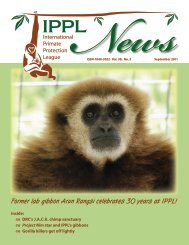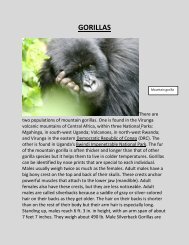Sammy - International Primate Protection League
Sammy - International Primate Protection League
Sammy - International Primate Protection League
You also want an ePaper? Increase the reach of your titles
YUMPU automatically turns print PDFs into web optimized ePapers that Google loves.
pet traders, Anen is very traumatized and<br />
she panics if she feels abandoned.<br />
Each day the infants spend some time<br />
being introduced to the older monkeys.<br />
Individual monkeys vary in their attitude<br />
towards the babies; some are absolutely<br />
besotted by them, while others are gently<br />
indifferent. The male monkeys are keen<br />
to have Toumai climb up on their backs<br />
for a ride, and Apu responds protectively<br />
when he hears distress calls from either<br />
baby. Although one of the young females,<br />
Ipak, is especially affectionate with the<br />
two babies, we have not seen what might<br />
be called real adoption behaviour. On one<br />
occasion Ipak enthusiastically carried<br />
Toumai high up into the branches of a tree<br />
and then abandoned him there. Luckily<br />
Gardel’s climbing skills are almost a<br />
match for a woolly monkey’s and Toumai<br />
was retrieved safely.<br />
Preparing for the big move<br />
Whilst the monkeys are being cared<br />
for at the rescue center in Moyobamba,<br />
equally important preparation work<br />
has been underway at the Rio Mayo<br />
refuge, some 40 minutes upriver.<br />
This land comprises secondary and<br />
small remnants of primary rainforest.<br />
Although it is just a tiny fragment of<br />
forest, such is the level of deforestation<br />
and environmental degradation in the<br />
Rio Mayo valley that it has already<br />
become an important refuge for wild<br />
animals. Groups of tamarins, squirrel<br />
monkeys, night monkeys, and the<br />
extremely rare, endemic Andean titi<br />
monkey all live in the refuge. Here the<br />
monkeys can find a sanctuary from<br />
hunters and from the fires lit to clear the<br />
forest on surrounding hillsides.<br />
Over the last five years the project<br />
has replanted some 2,000 tree seedlings,<br />
enriching the secondary forest with over<br />
45 different species of wild fruits. Some<br />
of these trees are already producing fruits<br />
and will be a vital supplement to the<br />
monkeys’ diet.<br />
Peruvian ecology students have<br />
volunteered to help with the replanting<br />
program and with a local campaign to<br />
——————————————————————— IPPL NEWS<br />
www.ippl.org ————————————————— April 2005<br />
19<br />
raise awareness about protecting primates.<br />
In the peak hunting season—March and<br />
April—they have put up posters in the<br />
regional market towns where monkey<br />
meat is sold and baby monkeys are traded<br />
as pets. They have also talked to many<br />
people in the communities surrounding<br />
the Rio Mayo refuge, asking for their<br />
cooperation in protecting the monkeys<br />
on our land.<br />
This last month work was completed<br />
on the woolly monkeys’ new housing at<br />
the refuge. They will have a huge 100m²<br />
(10,000 square foot) enclosure, with<br />
an opening out into the forest and preestablished<br />
trails to help them explore<br />
their new environment. The Ikamaperu<br />
team too will be moving and everyone<br />
is getting ready for a complete change<br />
of life: living together communally<br />
on the land and putting up with basic<br />
conditions “in the bush.” They know<br />
that solidarity, imagination, and passion<br />
for their job are the best guarantee for<br />
success in this new adventure with the<br />
woollies.<br />
Nightclub Monkeys Moved to Rainforest Zoo<br />
Following a years-long “Free the<br />
Monkeys” campaign by Hawaiian animal<br />
protection organizations and concerned<br />
citizens, three squirrel monkeys kept<br />
on display at Honolulu’s Blue Tropix<br />
nightclub were transferred to the Panaewa<br />
Rainforest Zoo, in Hilo on the “Big<br />
Island” of Hawaii, in January 2005.<br />
The three monkeys, one male and<br />
two females, now live in an outdoor<br />
quarantine area. The zoo already has four<br />
squirrel monkeys in a half-acre enclosure<br />
and, once the newcomers’ health checks<br />
are completed, the zoo plans to merge<br />
the two groups.<br />
In the April 2001 issue of IPPL<br />
News, IPPL asked readers to protest the<br />
exhibition of squirrel monkeys at the<br />
raucous Blue Tropix nightclub. Three<br />
animals were being housed in a glassfronted<br />
enclosure and subjected nightly<br />
to unavoidable stares from bar patrons<br />
(considered a threatening behavior by<br />
many primate species), loud noises<br />
produced by the sound system, and<br />
disturbingly bright lights in the middle<br />
of the night. The animals were reported<br />
to exhibit abnormal behaviors typical<br />
of highly stressed monkeys, including<br />
head twirling, excessive scratching,<br />
and repetitive movements. They had no<br />
outdoor access.<br />
Many readers responded with letters<br />
to government agencies protesting<br />
the incarceration of monkeys in such<br />
inappropriate surroundings. Said Betty<br />
Kamida, one of the leaders in the effort<br />
to help the Blue Tropix monkeys, “The<br />
‘Free the Monkeys’ organizers would like<br />
to thank all the IPPL readers who took the<br />
time to write to the agencies. These letters<br />
were a significant part of the public records<br />
that were obtained and scrutinized to<br />
move the government agencies to action.<br />
Mahalo! [Thank you!]” This transfer to<br />
an environment more consistent with the<br />
animals’ welfare is certainly a victory for<br />
primate lovers everywhere.<br />
Zoo director Dick Mortemore told the<br />
Honolulu Star-Bulletin that the monkeys’<br />
reactions to their new home seemed to<br />
be, “Oh my gosh, there’s sky up there.<br />
They appeared to be curious about the<br />
new experience!”<br />
Congratulations to Betty Kamida, Linda Vannatta,<br />
and everyone involved in getting the monkeys out of an unsuitable environment!<br />
ARE YOU MOVING? PLEASE TELL US!<br />
Attention, readers! Please let IPPL know by post or e-mail if you change your mailing address. We would<br />
hate to lose track of you. IPPL E-Alert list members should let us know when they change their e-mail address.<br />
Contact us at info@ippl.org —thank you!










